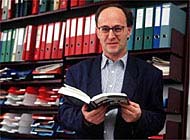“Magic Formula” still alive, but expect change in 2003, says Swiss academic

Switzerland's famed political culture of consensus is changing, according to historian Urs Altermatt, an expert on Swiss governmental politics. But he doesn't expect the "Magic Formula" to break down immediately.
In an interview with the “SonntagsBlick” newspaper, the canton Fribourg academic said that he didn’t expect major political changes before the 2003 general election. Despite strong words, Switzerland’s politicians lacked a real will to disrupt the status quo, he said.
Under the “Magic Formula”, devised in 1959, the seven-member Swiss government is composed of two Social Democrats, two Radicals, two Christian Democrats, and one member of the Swiss People’s Party.
The formula may have reflected the balance of forces of 1950s Switzerland, but People’s Party electoral support has been growing. The party emerged from last year’s elections as Switzerland’s largest political grouping.
This led to calls for an extra government seat from several in the party, including the right-wing member of the Zurich section, Christoph Blocher.
Right-wingers in the party have also been unhappy with government policy on a number of issues, ranging from reinforcing links with the European Union to Swiss participation in peacekeeping operations abroad. The People’s Party member of government, Adolf Ogi, has been the target of fierce attacks from the right, who claim he has failed to support their line, which they say is that of the majority of the party.
Ogi’s announcement last month that he plans to quit politics at the end of the year has led to a party debate over his replacement, and in particular which political wing he or she should represent.
But critics of the People’s Party from the country’s other governing parties have said that they should leave the government if they can’t support common policies. This would mean the effective end of the “Magic Formula”.
For Urs Altermatt the next three years will bring to a head policy clashes between Switzerland’s political forces. He said that issues such as European Union membership and pension reform would make current divisions even more acute.
He said he believed the People’s Party will maintain its electoral strength, and will not be ejected from the cabinet. The Social Democrats will be the losers in Altermatt’s scenario, with three Radicals, two Christian Democrats and two People’s Party members forming a new, centre-right government.
However, Altermatt did not exclude the possibility of a political shake-up across the Swiss spectrum, leading to more strongly profiled left- and right-wing blocs.
swissinfo with agencies

In compliance with the JTI standards
More: SWI swissinfo.ch certified by the Journalism Trust Initiative
You can find an overview of ongoing debates with our journalists here . Please join us!
If you want to start a conversation about a topic raised in this article or want to report factual errors, email us at english@swissinfo.ch.